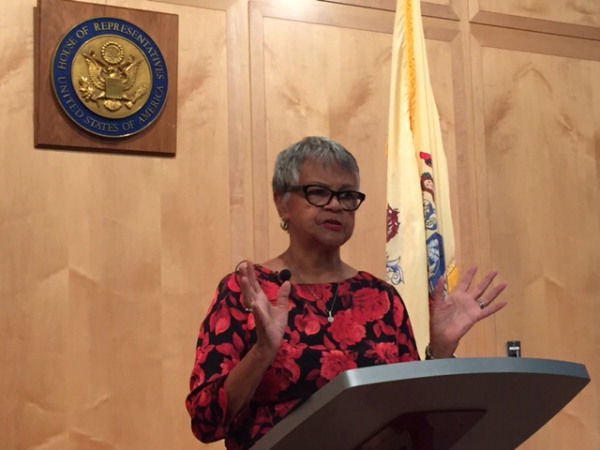By Philip Sean Curran, Staff Writer
Rep. Bonnie Watson Coleman on Friday used a stop in Princeton at a job seekers meeting to tout two bills she has sponsored in Congress to aid the long-term unemployed, including a tax credit for businesses that hire older Americans.
Ms. Watson Coleman (D-12) wants to prevent anyone who meets the definition of long-term unemployed from being charged “massive fees” for dipping into their retirement accounts to help themselves stay afloat. Also, she wants to incentivize hiring people age 55 and over who have been unemployed for 27 weeks or longer and collecting unemployment benefits by giving employers a tax credit.
“And so I recognize that these are just two solutions and these represent the tip of the iceberg,” she said in the Princeton Public Library before a room with unemployed state residents.
Earlier in her remarks, she framed unemployment as one of the “greatest issues facing policymakers in our nation,” with far-reaching implications.
“I say that because I firmly believe that unemployment is not just an issue for the person who has lost their job,” she said. “But it’s also a challenge for local businesses, which rely on a vibrant and eager consumer base to continue to grow and thrive and spend.”
And anything that threatens that consumer base, threatens our local commerce.”
She pointed to how losing a job also can have implications for a person’s health when they lose their employer-provided insurance, as well as the struggles that job loss put on families and children.
“I’m invested in finding solutions,” she continued, “because there are intricate links between unemployment, our economic strength and, most important, our quality of life for the families in New Jersey and across our country.”
Even with the national economy adding jobs in September, New Jersey ranks in “the top three states” for the percent of its unemployed residents who “fall into the long-term category,” Ms. Watson Coleman said. And nearly half of those people are over the age of 45, she added. The federal government defines long-term unemployed as people who are looking for a job for 27 weeks or more.
Last month, the Christie administration said the unemployment rate in New Jersey in August stood at 5.3 percent — even as the state added 2,200 jobs.
“In many ways, we fit the national trends for the long-term unemployed,” Ms. Watson Coleman said of New Jersey.
A labor expert who spoke after the congresswoman touched on some of those trends.
Maria Heidkamp, a researcher at Rutgers University’s Heldrich Center for Workforce Development, said that “one in four unemployed job seekers is out of work over six months,” roughly two million Americans.
“And this has stayed, the last couple of years, pretty steady,” she said.
In analyzing the numbers, the share of long-term unemployed is highest among people 55 and older, regardless of their education level, she cited. While New Jersey has ways to help people find work, the one-stop career centers around the state are “under-resourced” and do not have the resources to help the “chronically” out of work, Ms. Heidkamp said.
Age discrimination is another factor.
Employers, Ms. Watson Coleman said, “tend to discriminate against the long-term unemployed” because of “their age and the misguided belief that being out of the workforce has dulled their skills.”

